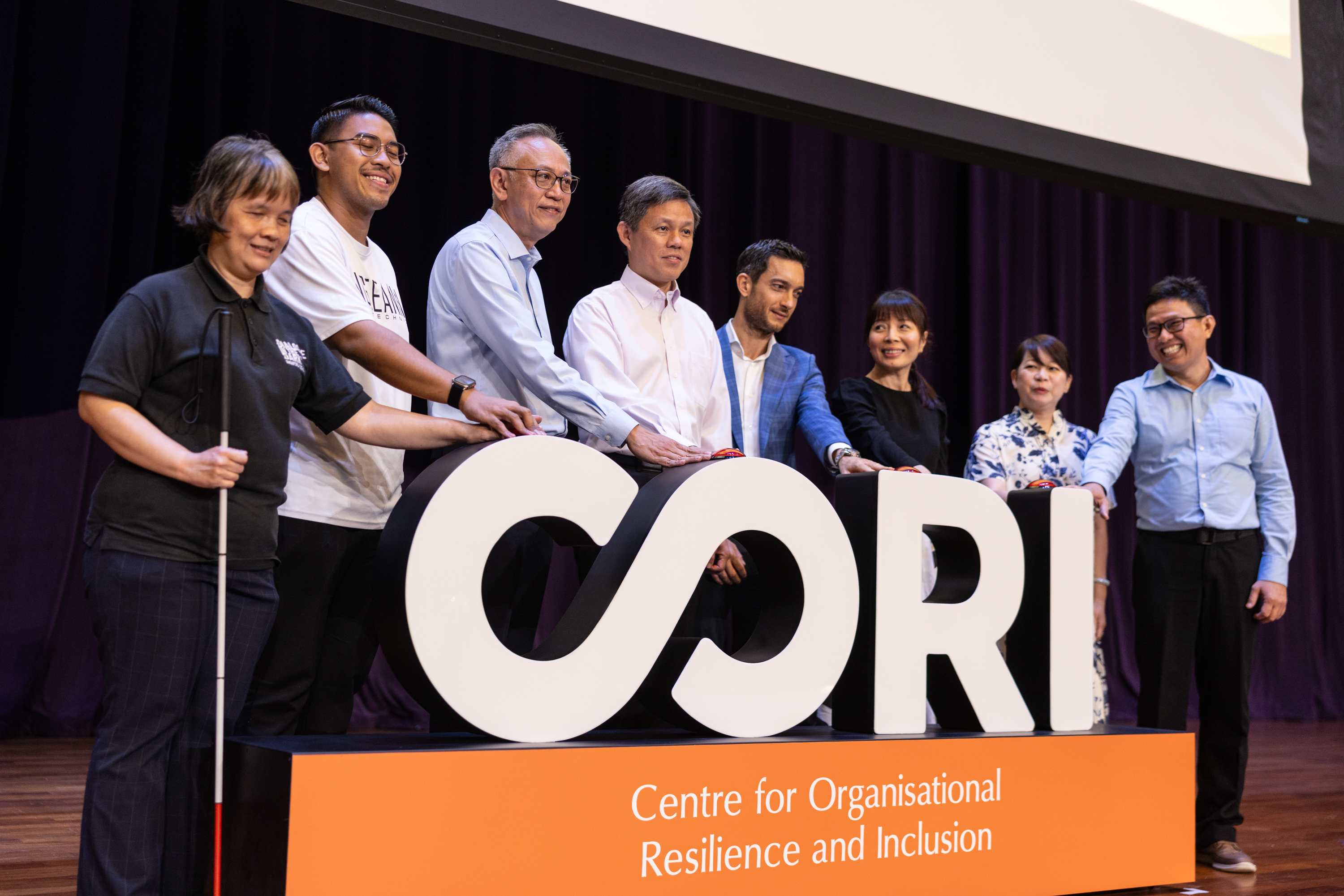Navigating change by overcoming resistance and fostering resilience
- Shawn Liew

(Fourth from left): Chan Chun Sing, Singapore’s Minister for Education, launched Ngee Ann Polytechnic’s Centre of Organisational Resilience & Inclusion (CORI), which plans to shine spotlight on social sustainability. (Image courtesy of Ngee Ann Polytechnic)
For many people, there is comfort to be found in familiarity and any events that deviate from the norm can cause extreme anxiety and resistance.
In the workplace, however, change is inevitable and arguably necessary for organisations to drive continued success. What then, can HR and people leaders do to better address employees’ aversion to change?
For a start, it is critical to understand that resistance is simply a counterforce, suggested Lau Yu Ching, Head of Programmes, Ngee Ann Polytechnic, Centre of Organisational Resilience & Inclusion (CORI).
Speaking with HRM Asia, she said, “As human beings, we are subjected to various internal and external forces everyday and we develop resistances to maintain some stability. Resistances are not just about saying no – they can manifest in different ways.”
In the workplace, team members may disagree with a leader’s attempts to move the team in a different direction but are unwilling to voice their opinions. Instead, they end up doing the bare minimum to please the leader.
 “When an entire organisation can take care of the human need for safety, trust, and stability, it is then possible to facilitate the process of change and renewal that is often necessary for organisational survival.” – Lau Yu Ching, Head of Programmes, Ngee Ann Polytechnic, Centre of Organisational Resilience & Inclusion (CORI).
“When an entire organisation can take care of the human need for safety, trust, and stability, it is then possible to facilitate the process of change and renewal that is often necessary for organisational survival.” – Lau Yu Ching, Head of Programmes, Ngee Ann Polytechnic, Centre of Organisational Resilience & Inclusion (CORI).
A leader may also be uncomfortable with giving negative feedback to staff and end up constantly sugarcoating words, resulting in a lack of genuine progress in the team. Another example is when underperforming employees blame clients for not taking up their offers.
“In each of these examples, the realities of change, of being honest, or of underperforming cause discomfort and anxiety,” said Lau. “People will always find ways to establish some semblance of stability for themselves by resisting these realities – either by deflecting, withholding information, or projecting their discomfort and anxiety onto others. Over time, these behaviours can become deeply rooted and cause strains in the organisation.”
A key intervention strategy she recommends is building psychological safety, the purpose of which is not only to make people feel good and safe, but also to enable a clearer emergence of data and information sharing within the organisation, so that decisions are more well-informed.
Key to this initiative is having leaders and individuals work through their internal resistances first, to establish their own sense of safety and stability, before intervening on others. “When an entire organisation can take care of the human need for safety, trust, and stability, it is then possible to facilitate the process of change and renewal that is often necessary for organisational survival. At CORI, we posit that building psychological safety is a skill that can be learnt,” said Lau.
CORI brings social sustainability to the fore
Launched this August, Ngee Ann Polytechnic’s Centre of Organisational Resilience & Inclusion (CORI) will provide training, consultancy, and research in human system design. In the face of increasing diversity and inclusion, CORI’s focus on organisational resilience and inclusion will equip learners with the practicable skills to build healthy systems that bring about positive and long-term social impact.
To commemorate the launch of CORI, Chan Chun Sing, Singapore’s Minister for Education, helmed a panel discussion on social sustainability. One of the talking points during the discussion centred around how profit-driven organisations are failing to create a culture that encourages employees to experiment and fail, without fear of repercussions.
While acknowledging that more can be done to better support employees, Lau was quick to add, “Through our interactions with industry, we sense that businesses and corporations understand that there are undesirable trade-offs to maximising profits at all costs. However, the transformation of mindsets from meeting shareholders’ needs to meeting stakeholders’ needs is not an easy task. The reality is that the bottom line is essential to the survival of a business, especially in times of global uncertainty and impending resource scarcity from phenomena such as climate change and geopolitical conflicts.”
However, this does not mean that profits and purpose are mutually exclusive. In line with the concept of social sustainability, CORI aims to help organisations thrive in a sustainable way.
From this perspective, the point is not to discount the need for profits, but rather to expand the understanding that profits and purpose can not only co-exist, but serve to mutually reinforce each other, generating a virtuous cycle, explained Lau.
She added, “Organisations are ultimately formed by people. Our belief is that a “both-and” mentality – both profits and purpose, both doing well and doing good – can be developed in individual leaders, managers, and staff.”
To this end, the programmes at CORI do not just focus on capability building, which is more skills oriented. Instead, they go further to enhance the capacity of individuals and teams to better hold tensions and paradoxes.
“As a core part of our training methodology focuses on the personhood of the learner – and not just the content to be delivered – it will expand the range of people dynamics that the learner can recognise. This will in turn enable learners to be more choiceful in the ways they lead themselves and others,” said Lau.
In the longer term, it is also imperative that organisations and individuals in Singapore develop resilience and agility to thrive in ever-changing world. Describing resistance as a function of evolution, Minister Chan also used the metaphor of the amoeba – a shape-altering cell or unicellular organism – to explain why it is important for Singaporeans to continue to be agile and adapt to change.
READ MORE: Leveraging employee engagement to drive workforce transformation
Looking to play a key role in helping to drive collaboration and resilience between organisations and employees in Singapore, CORI believes that agility exists not just in behaviours.
“Often, the inability to shift comes from a ‘stuck-ness’ in not being able to name or see existing issues, the unwillingness to move, the fear of the unfamiliar, or the lack of conviction or belief to act,” said Lau. “Thus, having greater clarity on why we are able or unable to shift is key.”
To find out how CORI’s 300-hour programme on Organisational Design and Sustainable Culture can help learners acquire the language to recognise the patterns of stuck-ness or movement in their organisations and systems, click here.
For more news and analysis on the latest HR and workforce trends in Asia, subscribe to HRM Asia and be part of the region’s largest HR community!






